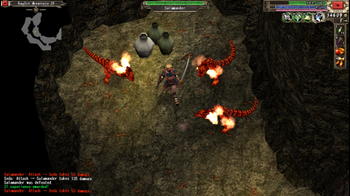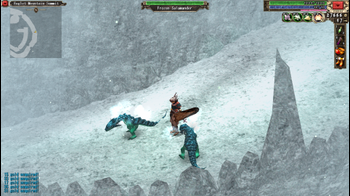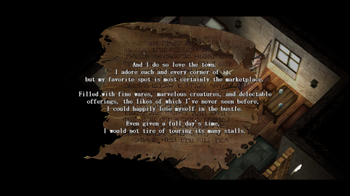
Xanadu Next Review
Waiting for a localization of a Japanese game sometimes takes patience. Luckily, in today's gaming climate, the West is getting more and more localizations of even niche titles, and the wait time in between region releases have dramatically improved - for the most part. However, there are always those titles that seem destined to be forever stuck to Japanese shores. As time passes, holding out hope for these games can be difficult.
Xanadu Next is one of those games I had heard praise about for many years from many different places. I was told how it blended Ys and Diablo gameplay styles with a medieval gothic setting, and everything I knew about it seemed right up my alley. The localization team at XSEED is no stranger to dedicating effort in releasing older games in English - as evidenced with their continued releases of the Trails in the Sky series among other games. When they announced that Xanadu Next was finally getting an official release, it immediately became one of my most anticipated titles for the year.
And let me put it plainly - Xanadu Next did not disappoint.
Xanadu Next opens up as the scholar Charlotte and her ex-knight bodyguard (you, the player character) travel to the island town of Harlech to study the many ruins there.
In addition, this island plays host to a strange phenomenon: the mysterious appearance of an ancient castle - dubbed Castle Strangerock - that appears when an abundance of fog gathers over the lake.
Although many have claimed to have seen the castle, anytime someone tries to approach it, it'll disappear like a mirage.
Soon after arriving at Harlech, the ex-knight is nearly killed in a quick skirmish with a rogue swordsman. After some events, you are told that the ruins are said to house the fabled Dragonslayer sword which holds the power to bring you back to full vitality. Exploration of the ruins quickly goes from one girl's curiosity to a matter of life and death.
It doesn't take long to get comfortable with Xanadu Next. It is a very intuitive game to play, much like the PC Ys series titles from the same developer. While there are a few various skill & magic mechanics and some inventory management that take just a little getting used to, within minutes you'll have grasped all the game's systems readily. One thing Xanadu Next does well is creating an addictive combat style that isn't too complex to overwhelm players, but isn't too simple to be boring. It meets a good median.
Most of the time, you'll be exploring the island through a series of small interconnected rooms, fighting off a variety of monsters while searching for treasure chests. If you play with a mouse & keyboard set up, you use the cursor to control nearly everything you do, from attacking monsters in real time to inventory management. Diablo is often used as a comparison point with respect to this, but Xanadu Next only features very light looting elements.
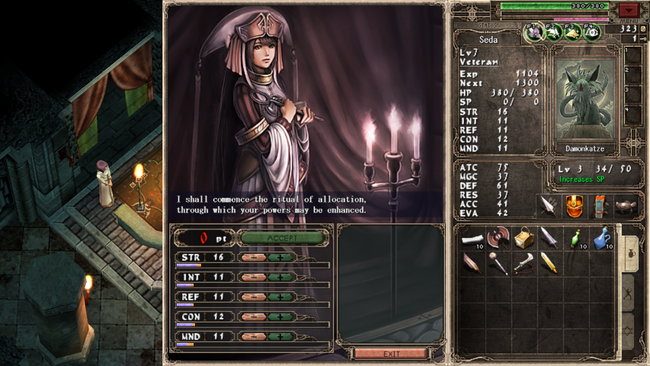
There are a few main subsystems that play roles in Xanadu's combat: Skills, Magic, and Guardians. Skills are inherently tied to the various weapons found during the game. When you use a certain weapon, you become more proficient with it, and eventually you can innately learn the skill it possesses. The skills range from active attacks like thrusts to passive abilities such as improving your movement speed.
Magic is pretty simple. You can find tomes that, once used, teach you a magic spell. These work similarly to skills in combat, they are simply acquired in a different manner. These spells range from a simple fireball to a lightning storm that hits all enemies on the screen.
Guardians are essentially like a tarot card that the player can equip. They offer special bonuses like increasing your total health, to improving the chance of enemy drops, to improving your magic power. You can only equip one at a time, and the more you use one, the more potent it becomes.
All these systems work especially well with each other. Powering up guardians, learning skills from weapons, finding new magic - all these elements lead to combat that feels addicting and rewarding. You continually learn new techniques to expand your repertoire, keeping combat fresh throughout. Gameplay never gets especially complex or deep, rather Xanadu Next relishes its relative combat simplicity.
Although Ys and Diablo comparisons are the ones I had most often heard when discussing Xanadu Next, another similar game that often came to my mind was Vagrant Story on the original PlayStation. The combat itself is quite different, but I thought that the general game structure and story beats share a lot in common.
The game world of Xanadu Next is basically one long interconnected dungeon. There are various settings such as a forest maze, underground crypt, and even the inside of a volcano.
You'll find items that allow you to traverse to new areas and unlock shortcuts back to old ones. Backtracking to old areas with new field items can also lead to hidden chests you couldn't reach before.
Seeing how the dungeon areas intersect and finding hidden treasures are just more elements of the game that makes playing Xanadu Next so addictive. I honestly had a hard time putting it down.
I also found a lot to like with the game's story. Xanadu Next isn't an especially narrative heavy game. There are a fair number of dialogue scenes, but they are well dispersed during the game and only tell part of the tale.
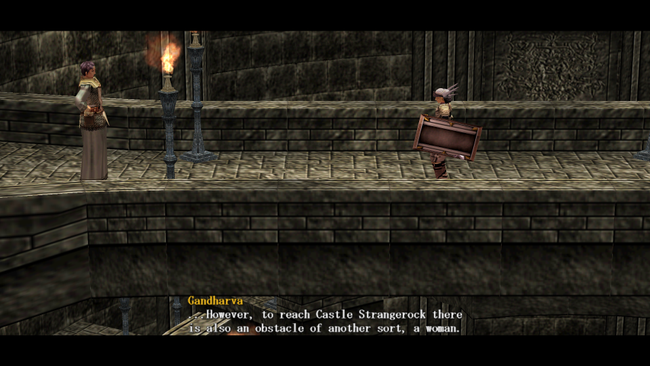
One thing I really appreciated about Xanadu Next's storytelling is that it does not beat the player over the head with exposition and explanations. In fact, much of the game's narrative is not told through dialogue, but instead through the many Tablets and Memoirs you find throughout the game. Tablets are historical records that detail the events of the downfall of the lost kingdom Xanadu, where the Memoirs are from a diary during the same time.
Getting parts of Xanadu's story from both a dry history perspective and parts from a personal character perspective is a bit fascinating. Not only was I having so much fun exploring and fighting monsters. I wanted to find more pieces of the story to put them together in my head.
You also meet a handful of characters whose motives on the island are not immediately clear, including the rogue swordsman that nearly kills you at the game's onset.
In short, the way Xanadu Next blends the story told from the Tablets, Memoirs, and dialogue spoken during in the game is remarkably done. If you were to write out the story of Xanadu plainly - it probably wouldn't be as compelling on its own.
But, this combination of narrative devices working in tandem to slowly unveil the mysteries of the island - gradually realizing how all the pieces and people fit together tells the story. It works incredibly well. It also helps that the game's text and dialogue is also well written. Xanadu Next's overall tone, including its fantastic musical score, is especially appropriate. I found the game's finale - from a story perspective specifically - also to be quite compelling. The way everything comes together is simply satisfying.
The only real prominent criticism I can muster up about the game is that the game boss creatures aren't as quite interesting as I had hoped. They are certainly serviceable, but I couldn't help but feel a little disappointed in both what the bosses were and how you take them on.
One thing I also want to emphasize is that Xanadu Next doesn't overstay its welcome. Everything in the main game can be done in 10-15 hours. There's a level of simplicity underneath everything that leads to a very comfortable feeling with this game. Nothing is overlong and nothing is over-intricate, from story to mechanics. Its a tight-knit experience that knows how to keeps pace.
Xanadu Next is a treat - a well crafted package that blends addictive combat, fun progression systems, pleasant exploration, great music & atmosphere along with a compelling story that doesn't get in the way. The whole experience is simply delightfully satisfying. Sometimes, good things come to those who wait.
